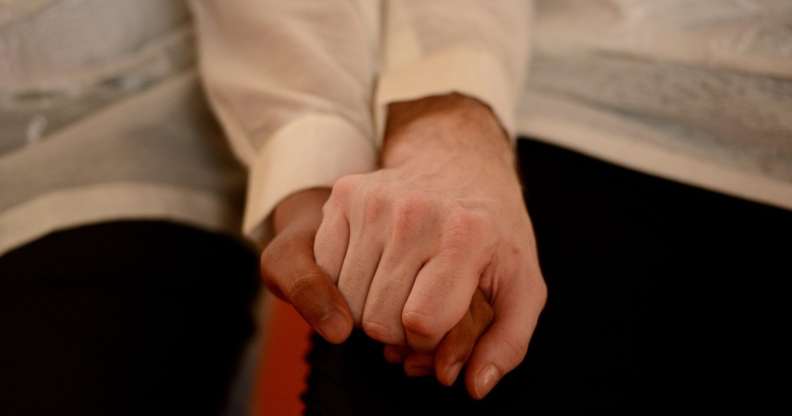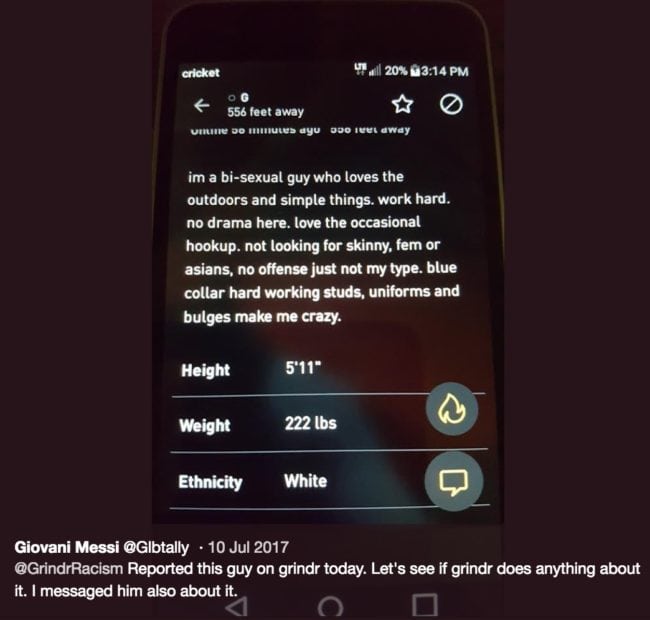‘I’m gay, brown, and feel invisible in Britain’s homogeneous white, gay community’

Noel Clis/AFP/Getty
“People ask why we need Pride, here’s proof.”
These words—or some iteration of them—alongside a link to a news story about the most recent brutal homophobic attack, or some form of homophobic abuse, were commonplace on Twitter last week in the lead up to Saturday’s Pride in London.
The tweets rightly highlight the discrimination and homophobia that still exists in wider society today. But there’s a hypocrisy in the LGBT+ community that makes me uneasy. Within our own community, race discrimination is rife—particularly in Britain and, in my experience, particularly in London.
Just days before the Pride march, Stonewall released statistics indicating that 51 percent of BAME people who identify as LGBT+ have “faced discrimination or poor treatment from the wider LGBT community.” For black people, that figure rises to 61 percent, or three in five people.
These figures may seem shocking to you—unthinkable even—but try living this reality.
The dichotomy in which I exist in the LGBT+ community has always made me feel uneasy about embracing said community: On one hand, I am a gay man in my 20s. On the other hand, I feel the burden of my brown skin creating more oppression and more discrimination, in an already oppressed, discriminated and marginalised community. Why would I want to be part of that?
The prejudice unfurls itself in myriad ways, in real life, online, or through dreaded dating apps.
Just a couple of weeks ago, before she finally found some luck with Frankie, I watched Love Island’s Samira—the only black woman in the villa—question her self worth, her attractiveness, after failing to get picked to couple up. It stoked a familiar sense of self-scrutiny when, in the past, I’ve been at a club with predominantly white friends and found myself feeling invisible as they were approached by other revellers. It resurfaced the familiar sense of erasure when, in a group setting, I have been able to measure the minute conversational attention paid to me compared to my white friends—as if my worthiness of being spoken to was being measured by my perceived attractiveness. These actions may be subconscious and therefore unrealised from the other side, but, for us, it’s numbingly commonplace.

Grindr racism Twitter page (Twitter)
The internet and dating/hook-up apps like Grindr are more treacherous—and humiliating—waters to navigate. On Grindr, some men are brazen enough to declare things like, “No blacks, no Asians,” in their profiles. In fact, there’s even a Twitter page dedicated to some of the worst of it.
Then there’s the men that codify their racism as “preference.” The common turn of phrase, “Not my type,” can in most cases—though, granted, not all—reliably be interpreted to mean, “Not the right skin colour for me.”
On Grindr and other similar apps, there is an emphasis placed on race that seems disproportionate to other aspects of everyday life. Questions such as, “What are you?” and the old classic, “Where are you from? No, where are you really from?” are an almost daily occurrence and are considered acceptable, the norm. Why? I don’t get stopped in the supermarket every day and questioned about my roots.
We must question why within the gay community we continue to perpetuate racial inequality under the guise of “preference.”
In a 2003 study, researchers Voon Chin Phua and Gayle Kaufman found that, compared to men seeking women, men seeking men were more likely to mention their own skin colour as well as their preferred skin colour and race in a partner.
What’s more concerning is that there is an emphasis on “whiteness,” suggesting that Eurocentric ideals of beauty continue to inform our so-called preference.
Say Phua and Kaufman:
Gay White men mostly mention their blond hair and blue eyes whereas gay Hispanic men focus on the lightness of their skin and their nonblack hair and eyes. An example is a gay Hispanic man who highlights the fact that he is a “light skin Hispanic (but people pass me for white).”
For those with darker skin, like black, or South Asian men, this further reinforces the feeling of not being enough.
So, where to from here? Stonewall’s survey finally gives some credence to what many of us have been screaming into the void in our private lives. It also justifies the need for events like UK Black Pride, where people of colour can have safe spaces to explore and express their identities.
What’s most important, though, is to realise and acknowledge privilege. You don’t need to apologise for it. But acknowledge it.
In Britain, the prevalent image of queerness—whether pictures from Pride or on television—is white, cis, gay men. We mustn’t be lulled into believing that because there is more acceptance for white, cis, gay men, that it’s as easy for the rest of us.

